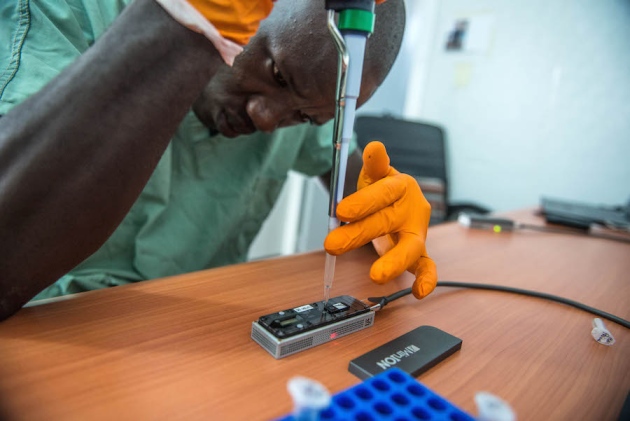
Biomedical researchers are dismayed over a patent dispute that could threaten an innovative method for sequencing genomes.
Sequencing giant Illumina said on 23 February that it has filed a lawsuit against UK-based Oxford Nanopore Technologies, the first company to commercialize nanopore sequencing. The technology reads single bases of genetic material as they pass through a nanoscale pore.
The suit, by Illumina of San Diego, California, alleges that Oxford Nanopore has infringed on Illumina patents that describe aspects of using pores to read DNA. Oxford Nanopore has its own suite of patents related to nanopore sequencing.
The two firms have sparred before. Illumina was once an investor in Oxford Nanopore, but that relationship ended in 2013, after the smaller company switched its focus to develop a nanopore technology that was not covered by their agreement.
Illumina does not market a nanopore-based sequencing system. Its machines use a different approach, called sequencing-by-synthesis, in which short stretches of genetic material are read, then computationally stitched together. But the company says that it is working on a nanopore system and “has made substantial investments to obtain licenses and develop the nanopore sequencing technology”. It says that Oxford Nanopore’s technology infringes on its patents.
Sparring partners
Researchers have reacted to the lawsuit with disappointment. “Sad to see this. We need both of them concentrating on producing great tech,” tweeted computational biologist Richard Leggett of the Genome Analysis Centre in Norwich, UK.
Oxford Nanopore’s MinION sequencer, which became commercially available last year, is a palm-sized device that has created a buzz among users for its speed, portability and low cost relative to competing machines. Unlike Illumina’s sequencers, the MinION can also read data in real time.
Because it is not yet practical to use the device to process human genomes, the MinION does not pose a serious threat to Illumina’s market dominance in high-throughput human genomics. But Oxford Nanopore is planning to debut a higher-throughput system, the PromethION, this year — and to issue an initial public offering.
“The timing of this [lawsuit] really stinks,” wrote computational biologist Mick Watson of the University of Edinburgh, UK, on his blog, Opiniomics. “Given ONT are set to float on the stock market, it’s hard not to see this as a deliberate attempt to scupper that.”
Calling himself a fan of both technologies, Watson says he is disappointed by the tussle: “It’s like having two of your friends fighting.”
The major question now is whether the lawsuit will derail Oxford Nanopore’s plans by diverting resources away from developing its technology. Biotechnology venture capitalist Vishal Gulati calls the fight a “one sided battle”, saying that Illumina has deeper pockets and a track record of suing competitors successfully.
Oxford Nanopore has attempted to allay those concerns. “It is gratifying to have the commercial relevance of Oxford Nanopore products so publicly acknowledged by the market monopolist” for next-generation sequencing, said company chief executive Gordon Sanghera in a statement on 24 February. “We do not anticipate any disruption to our ongoing commercial progress as a result of Illumina’s action, which we believe is without merit.”.
[“Source-nature”]
 Techosta Where Tech Starts From
Techosta Where Tech Starts From